
November 12, 2023
“This is it. Stop at the museum in the center of town. That’s what they said.”
The main street of Andersonville, Georgia is 3 blocks long with a large obelisk monument in the center of the street. There is no interstate highway nearby. Even the two lane state highway manages to miss the town. One has to know where to turn to find it. We pull in and parallel park in a row of empty diagonal parking spaces on Main Street. One person walks up the otherwise empty street. The color of the overcast sky is Confederate gray.
On August 7, 1862, George Hitchcock of Ashby volunteered in the 21st Infantry Regiment of Massachusetts. He kept a diary throughout the war. On June 2, 1864 he was captured by Confederate forces and sent to Andersonville prisoner of war camp in Georgia.
“We enter through the great double gates which shut us in from the world and for the first time are made to realize what are the horrors of the place of which rumor has already whispered. As we move slowly through the pressing crowd of our fellow prisoners… we see squalor and filth on every side. A terrible stench arises from the excrement which cannot be disposed of. Someone tells me I best sit down where the first chance offers, and this I do for if I had waited till dark, I’m assured I would not even find room to stretch out.“
GEorge Hitchcock, june 16, 1864,
We walk up to the door of the Drummer Boy Museum. I try the door. It doesn’t move.
From inside a voice shouts, “Push!”
I put some force against the door and it yields.
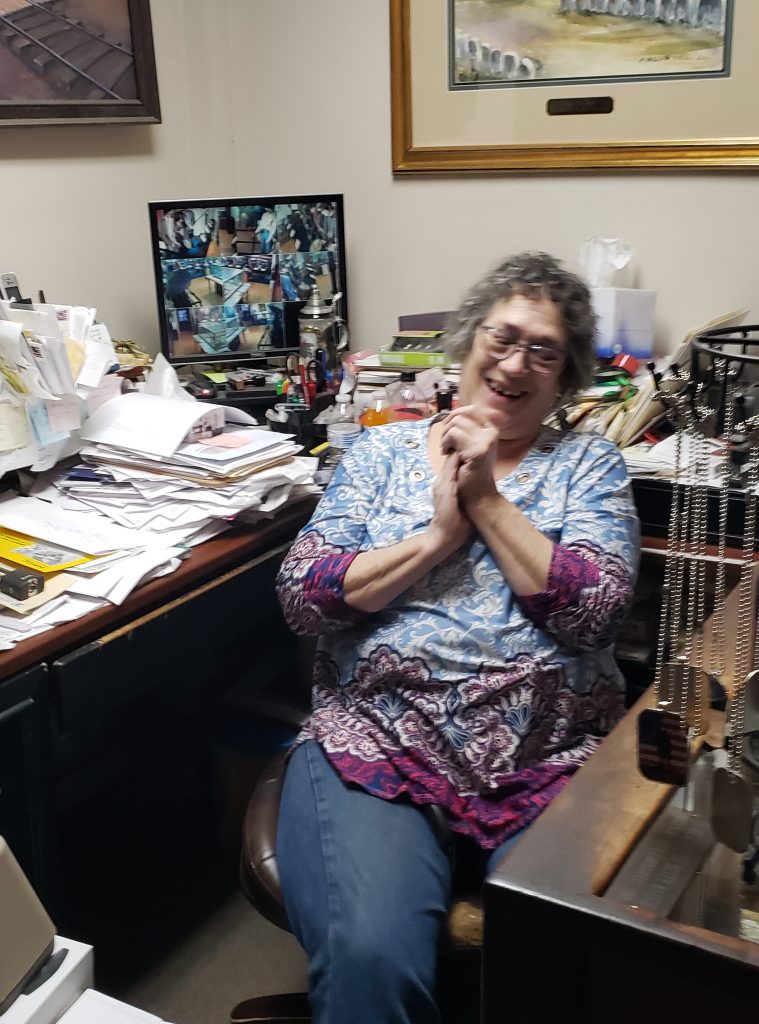
“Welcome to Andersonville. My name’s Cynthia” a women exclaims from behind the counter with a smile. “Y’all want to see the museum?”
“We do but we want to find the RV park.”
“The RV park is right up the street but you pay for it here. When you get up there you see Miss Kay. She’ll get you settled. Where y’all from?”
“Massachusetts.”
“Well you folks might of heard of Andersonville prison camp in the Civil War. This little museum is to explain the facts. I only go by the facts. What’s written in the books, … well, it’s got a perspective to it that doesn’t always line up with the facts. You been to the Federal Park yet?”
“No.”
“When you get there those rangers are going to give you the politically correct view. The one that’s approved. Well, you know how much you can trust the government. Here you’re going to get the facts. Now you go on up the street. I put you in site 12. Site 11 is a little soggy but site 12 should be dry. Miss Kay will be waiting for you.”
“Oh, tomorrow we’ll be having the Captain Wirz Honor Day. If you’re going to be around you might want to come by. Starts at 2. You know about Captain Henry Wirz?”
“No, I’m afraid I don’t.”
“Y’all come back here when you’re settled. I’m here until 3.”
We drive the block and a half up Main Street to the RV park. There are camping spots but no numbers on them. I stop. Then right on que a woman walks out from behind a trailer followed by 6 or 8 cats. I walk over to her.
“You must be Miss Kay.”
“Yes sir I am. Now you’re gonna be in site 12 which is right next to where you’re stopped.”
“You want me to back in?”
“Oh no sir. These are pull through.” she says with some pride. “You just drive up by the dumpster and over the grass.”
“Thank you ma’am.”
“You need anything you just come see me. I’m here all the time. Sure is cold for this time of year” she says as she pulls the housecoat tight around her shoulders and heads back to the trailer cats in tow.
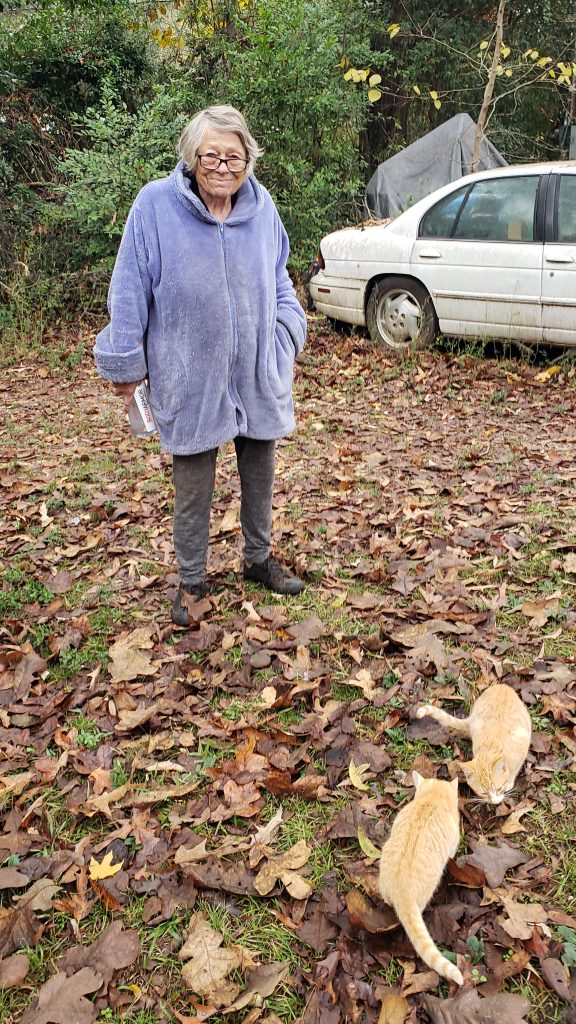
I walked back to the Drummer Boy Museum. The little Main Street is a mix of historic and more recent buildings. Stopping at the obelisk in the middle of the street I read the panels at its base.
CAPTAIN HENRY WIRZ
C.S.A.
Born Zurich Switzerland 1822
Sentenced to Death and Executed
Washington D.C. Nov. 10, 1865
I walk across the road to the little museum. I now know to push the door with force.
“Welcome back.” says Cynthia smiling. “You’re welcome to look around the museum. The prison was about half a mile beyond the railroad tracks that are just past this building. The trains would stop here and the Union prisoners would disembark on Main Street and be marched to the prison. We take no sides. Both Union and Confederate prisons were horrible. It was war. But Andersonville received the notoriety. The victor writes the history. We’re here to tell the truth. Go ahead on in. We ask you leave $5 in the donation box if you can afford it. If not, then whatever you can donate.” The little museum was very well done with a number of artifacts and a large model of the prison in center of the room. The prison was constructed by slaves who cleared the forest and used the logs to construct a 18 foot high palisade enclosing 16 acres.
Prisoners began arriving before the prison was completed. As they flowed in, Confederate Captain Henry Wirz arrived to take over command of the facility. Security is inadequate he determines. He orders a low wood fence built 20 feet inside the palisade. Guards are to shoot any prisoner entering the no man’s land between the fence and the palisade. Union prisoners call the crude fence the dead-line.
“Another man shot at the dead-line today The guard is composed of Georgia home guards. Either old men or very young boys, ignorant and cruel, unlike your average fighting rebel who has learned some spark of honor … Over one hundred men died today but their places were made good by a larger number who came in.“
George Hitchcock, June 21, 1864
As I leave the room housing the collection Cynthia is talking to a well-dressed older gentleman.
“I believe we’ll have 30.” he says. “Same as last year.”
“Well I’ll be cooking for 30 then. I have ham, collard greens, sweet potatoes and beans. Are they bringing the canon?”
“Yes. The artillery regiment will be here.”
“I best cook for 35 then. And I’ll have to make sure the gate is open too.”
Just then the door rattles. “Push!” Cynthia shouts. The door yields with a slight groan and a family of visitors enters the small entry room.
The older gentleman and I back into a corner to give the family space in the tiny office. Cynthia is busy giving them the introduction.
“Sounds like you have something going on tomorrow.” I say to him.
“We sure do.” he replies with the strong southern accent of someone born and raised here. “The Captain Wirz Recognition Day is tomorrow. We got folks comin’ from all over. Alabama, Florida maybe South Carolina. You know about Captain Wirz?”
“Well just what I saw on the monument.”
“You been over to the national historical site across the way haven’t you?”
“Yes. Just this morning.”
“They only tell you half the story. The half they want to tell. You see when the war ended they made a big ruckus about the POW camp at Andersonville. They showed photos of skeletal Yankees and said this was inhumane and it was all Captain Wirz’ fault. The truth is, what they don’t tell you, is the northern POW camps were just as bad. They don’t show you any photos of them.”
“When the war ended everyone was supposed to be pardoned. Paroled they called it then. Well the Yankee soldiers come and told Captain Wirz to gather his papers because he was being arrested and taken to Washington. The charges were the murder of 13 Yankee POWs at Andersonville.”
“Captain Wirz had joined the Army of the South in Louisiana. He was wounded in battle and couldn’t use his right arm. Because he couldn’t fight anymore Jeff Davis sent him here to run the prison camp and he did the best he could. Don’t get me wrong. Things were not good here but Captain Wirz tried get more food and clothing for the prisoners. He set up a hospital for them and many of the prisoners held no ill will toward him.”
This fellow is in in seventies or eighties dressed in a sports coat with an easy going way about him. He seems truly happy to be telling the story, smiling at every pause.
“When the Federal troops got him to Washington they set up a military tribunal to try him even though the war was over. They said he killed 13 prisoners, 3 by beating them to death. Well they never produced a single body and never explained how a man who could only use one arm could beat a soldier to death. And they wouldn’t let any prisoner who spoke favorably of him testify. It was a complete farce of a trial. Of course they found him guilty and hung him. Then after he was dead they cut head and arms and legs off and displayed them around the country. Like a carnival show.”
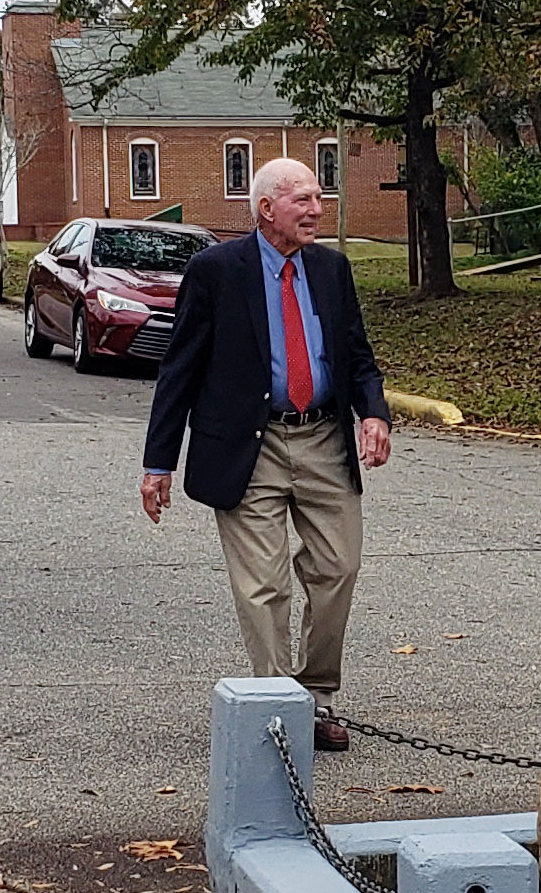
“So tomorrow we have a day to honor Captain Wirz. He was a loyal Confederate soldier who did the best he could under trying circumstances and he was treated unfairly and inhumanely by the government in Washington. We are doing our piece to restore his good name.”
“You stop by if you like tomorrow. 2 pm. That’s when it starts in the Village Hall. Best get there 15 minutes early to get a seat.”
“Thank you. I think I will.” I respond. “My names Alan by the way.”
“James. James Gasden. Where did you say you’re from?”
“Massachusetts.”
“You come tomorrow. You’ll learn something they don’t teach you about in the north.”
As our conversation comes to a close, the family is back in the office. A young man in full Confederate uniform browses the bumper stickers and mementoes on offer, his hobnail boot clicking on the wood floor. I try to catch his eye to ask if he is a re-enactor, but his parents are at the door and he turns away.
“Signs of scurvy have appeared in my mouth. The gums swell up and turn dark purple. Where others have it and do not recover, this swelling spreads in a few days until the face and neck turn black. My general feeling is one of complete lassitude and low spirits. I am feeling very poorly. Drew no bread today.”
george Hitchcock, September 20, 1864
I follow the family out the door and walk past the Village Hall to little municipal campground. Miss Kay is out in her house coat, cats circling around her.
“Good afternoon.” I call to her.
“Good day to you. I hope you’re enjoyin’ your stay. Exceptin’ for this weather. Lordy it is cold for this time of year. A course you northerners are used to it. Me, it goes right to my bones.”
“You come here every year?” I ask.
“Heavens no. I live here. I come to camp in 2007 and I never left. Nice place Andersonville. Real nice folks here.”
I glance around her campsite. The little fence she set up is partially fallen. Some belongings, perhaps once prized, peer out from under ragged tarps. The car has not moved in many months.
I agree. Everyone has been real friendly. Miss Kay heads back to her electric heater. I look forward to tomorrow.
In the morning we head to the American POW Memorial and museum. The politically correct federal park Cynthia referred to. It is large and we only get through a small portion before it is time to return for lunch. Main Street has changed in just a few hours. Cars are parked all the way up to the Village Hall. Some motorcycles have just arrived. I hurry through lunch and walk back down Main Street.
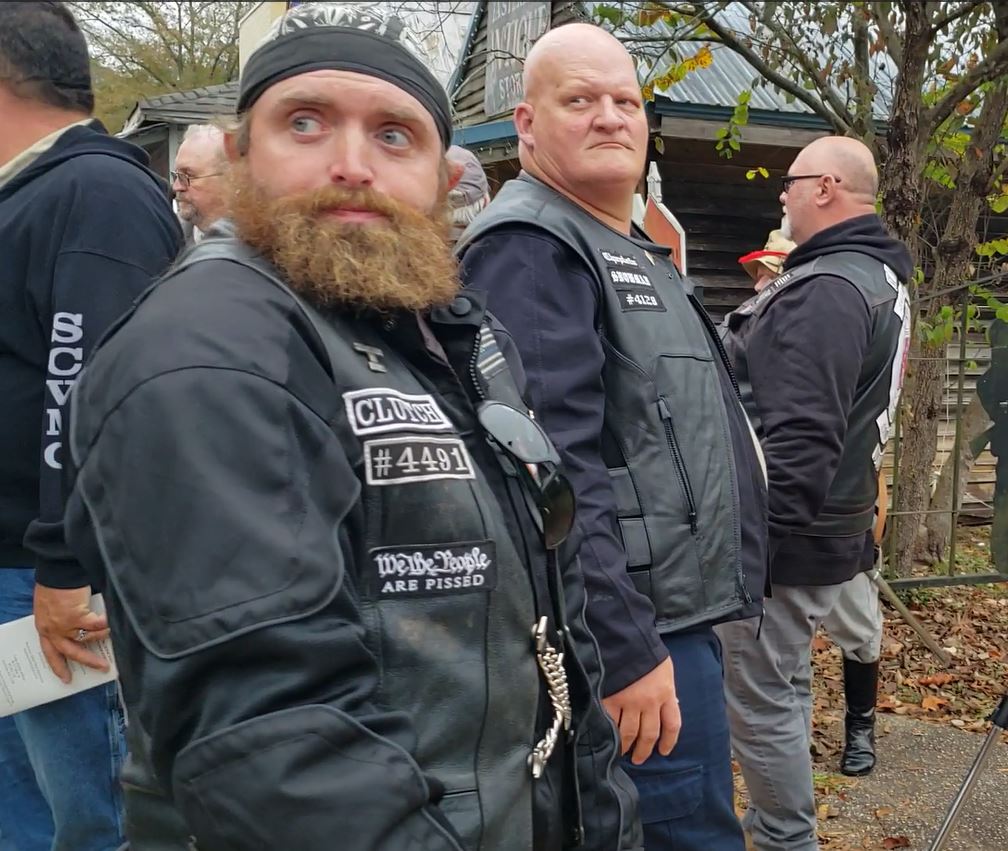
The motorcyclists are hanging around. I stop to admire their bikes but they pay me no heed. Their leather jackets emblazoned with the stars and bars and the words Sons of Confederate Veterans, Mid-State Defenders, Mechanized Cavalry.
They didn’t appear to want to talk so I strolled on to the man standing by the canon.
He was more forthcoming and explained how he’d been trained to fire these ancient artillery pieces. I asked if I could get a picture of him with his cannon. Just then the young man in the Confederate uniform from yesterday walked into the field of view.
“Sorry.” he said and moved to get out of the picture.
“No, please, I want you in the picture as well.”
He obliged and stepped forward, rifle in hand. As soon as the photo was taken the young man looked toward the monument and said, “I gotta go.”
I learn his name is Blake.
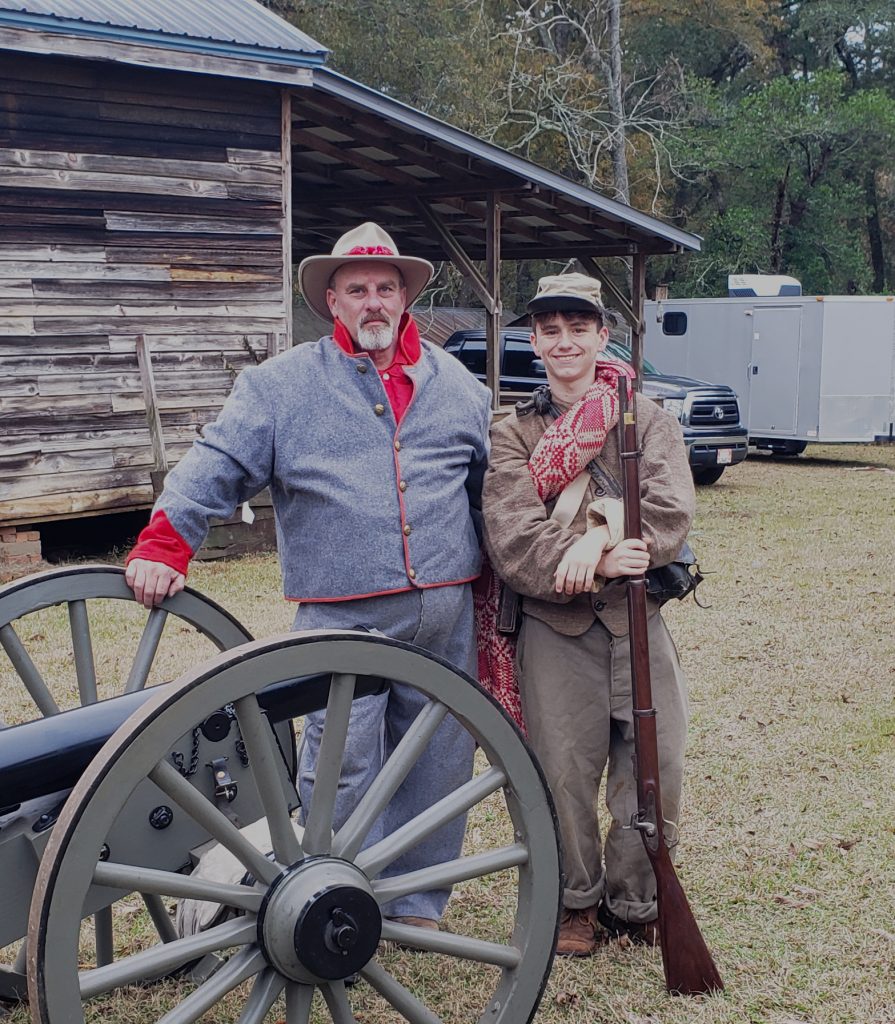
I turn to see James standing by the monument waving his arm for all to assemble at the Village Hall. I begin to walk toward the Hall with the others. Approaching the hall I notice the men are dressed in coat and tie or uniform or black leather. I, dressed in jeans and flannel shirt, say to James who is greeting people near the door. “I feel as if I’m not properly dressed for this.”
“Don’t you pay that any mind. Everyone is welcome.” he replies with a smile.
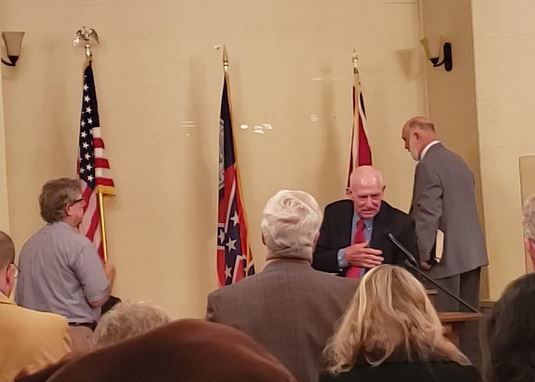
I find a seat in the back row. James takes the podium. “We begin today with the pledge to United States flag.”
Following the pledge of allegiance, I prepare to sit down.
“And the salute to the Confederate flag.” If I sit I will be the only one in the room to do so. I remain standing as the group recites the words.
“I salute the Confederate Flag with affection, reverence and undying devotion to the cause for which it stands.”
“Now our featured speaker, the Reverend Bill Weaver.’ James announces.
The Reverend Weaver is a tall distinguished man clearly practiced at the art of giving a rousing sermon. Beginning softly he speaks not of suffering or salvation but of blame. “The Union prisons were just as bad.” “General Sherman could have freed the prisoners here rather than marching to Atlanta.” “General Grant refused the offer of prisoner exchange.” Then, gradually lifting his voice until he is close to shouting as he speaks of the heroism of Captain Henry Wirz,
“Wirz would rather die than lie … rather die than perjure himself … rather die than betray the south!” Then, after a pause, in almost a whisper, “I got news for you folks … we don’t have too many men like that today.”
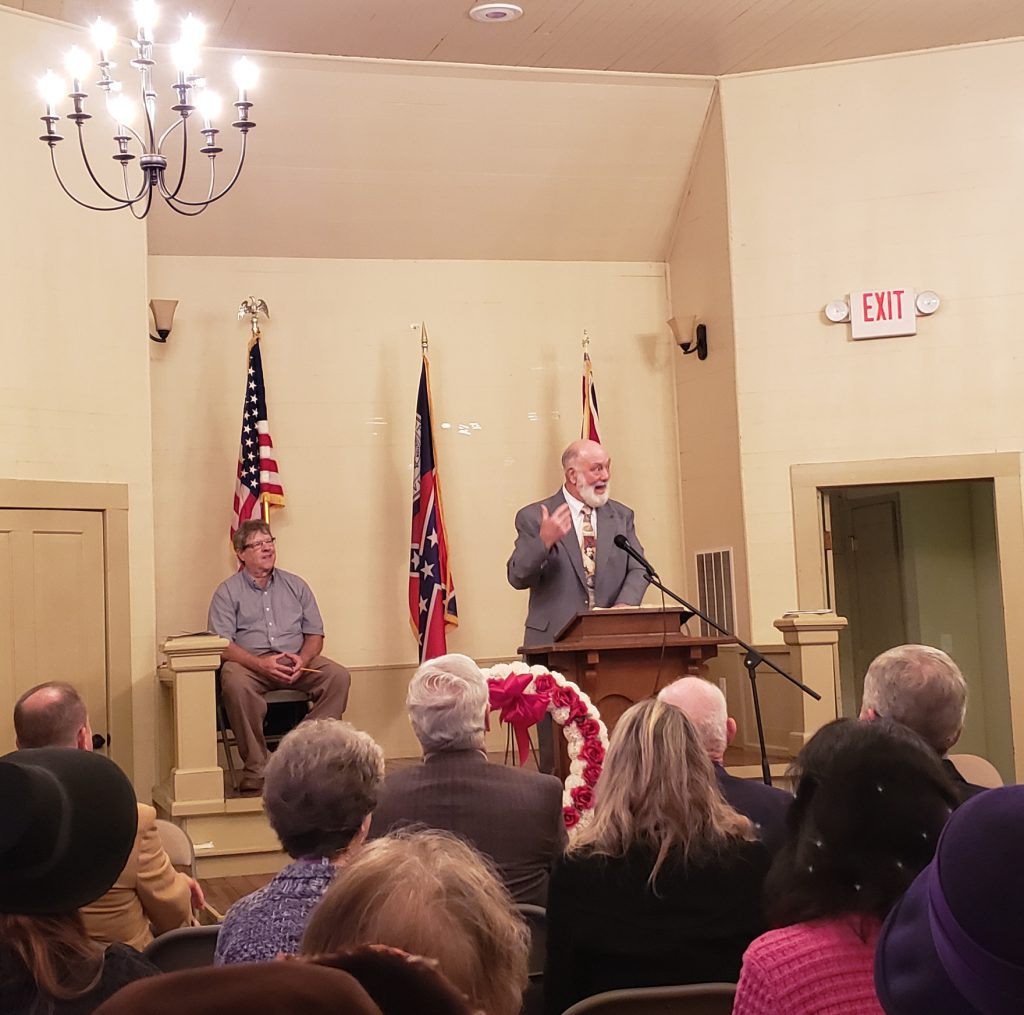
After standing ovation James takes the podium again.
“I’ve got one more thing if y’all can remain standing.” says James as he takes his phone out of his pocket.
“If I can get it to work. There it is.” he says with smile. A familiar tune, just audible, comes from the tiny speaker. The crowd joins in.
Following the song everyone heads down to the monument to Captain Wirz to lay wreaths at its base and chat.
A group of five men in Confederate uniform with period rifles march down the street and line up beside the monument. Blake is one of them. Three times they fire a salute, each echoed by the canon.
A group of five men in Confederate uniform with period rifles march down the street and line up beside the monument. Blake is one of them. Three times they fire a salute, each echoed by the canon.
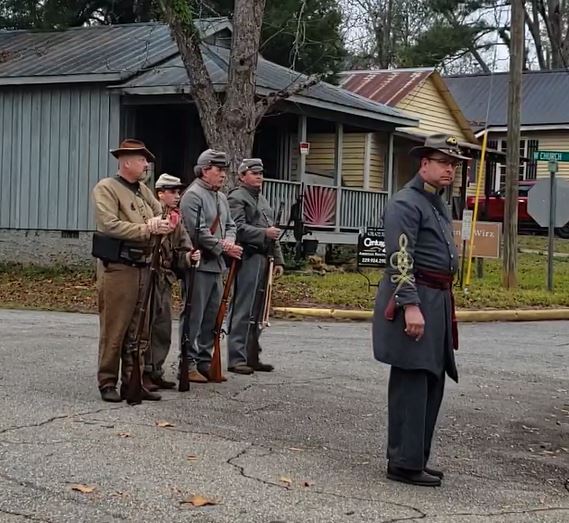
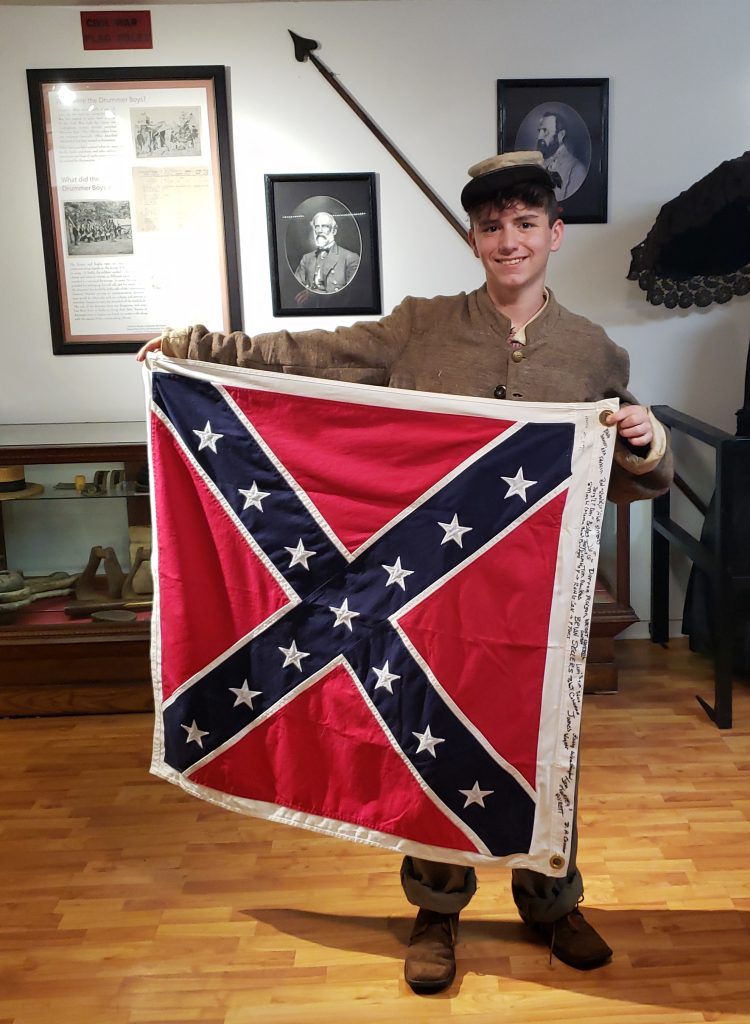
Later I run into Blake at the museum. He carries a flag which he is anxious to show. It has been signed along the binding by members of the Sons of Confederate Veterans.
“I think it would have been better if the South won the war. Then we would be our own country and make our own decisions.” he says with confidence in a mild southern accent. “Lincoln was a tyrant that wanted to see the south subjugated. That’s why he started the war.”
Several people in the small room express their agreement with him.
“Lincoln started the war?”
“He said he wasn’t going to bring canons to Fort Sumter but he sent 2 ships with canons to the fort. They were pointed right at Charleston. We had to defend ourselves.” he replies with shrug as teenager are wont to do.
“Let me ask you, where does your loyalty lie? I mean which are you most loyal to, the Confederacy or the United States?”
“The United States.” he replies without hesitation.
“Come on son. It’s time to go.” his father says.
I shake Blake’s hand.
“A pleasure to meet you sir.” and he heads for the door. I head back to camp.
“I am sleeping soundly at 10 o’clock at night when the summons came, and we are hustled up and out through the huge gates in pitchy darkness. Between two strong lines of guards about half the remaining portion of Andersonville prisoners pass to the railroad station. Whatever the future my have in store for us, we are devoutly thankful … that we are permitted to get out alive while so many thousands of our comrades are now under the sod all around us.”
George Hitchcock, November 2, 1864
One can’t help but feel the weight of history on this small Georgia town. The flags, the speeches, the reverence for a man long gone—all of it steeped in a cause that had no moral basis. A cause that tore a nation apart. A cause that James, Rev. Weaver, Blake and Cynthia hope to keep alive. I promise Cynthia to send her a copy of George Hitchcock’s diary, “From Ashby to Andersonville” to add to her facts.
The next day we hook up the camper and drive down Main Street, around the monument to Captain Wirz and over the railroad tracks that brought George Hitchcock and 45,000 other prisoners of war to Andersonville.
On the road again to look for America.
THE REST OF THE STORY
Nearly thirteen thousand prisoners of war died of disease, exposure and malnutrition at Andersonville prison during the 14 months it existed. In 1865 the prison burial ground was declared a national cemetery.
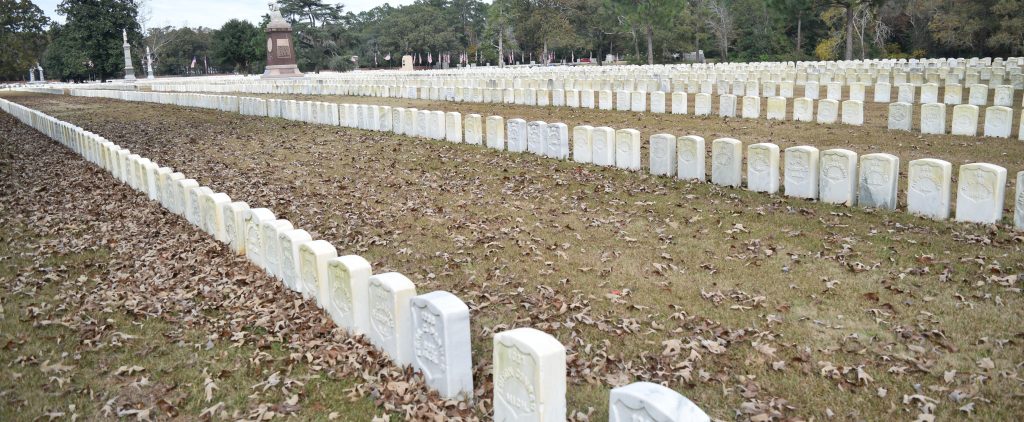
“The man most closely associated with Andersonville’s horrors, Henry Wirz, was executed on November 10, 1865, for war crimes. When prejudices nourished by the long war were greatly aggravated by the assassination of President Lincoln, Wirz’s death was encouraged by vindictive politicians, an unbridled press and a nation seeking revenge. He was the only Confederate official put to death after the war.”
Ronald g. watson, former Ashby High School teacher and editor of George Hitchcock’s diary
The war was never won. The myths gain credence. The gonads are tested daily. Damn yankees.